14 Dec 2017 - {{hitsCtrl.values.hits}}
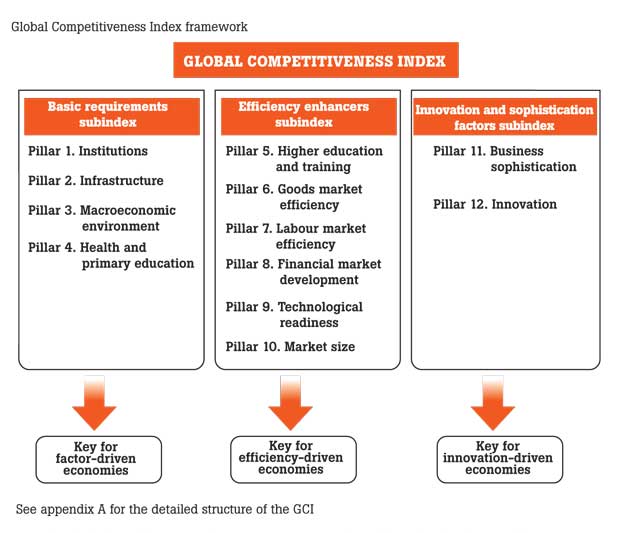
“Sri Lanka cannot become a hub by building infrastructure alone; liberal trade and investment policies are key”
– Dr. Saman Kelegama
From the first email sent in 1971 to the celebration of 10 years of the iPhone, today we all live in the  fourth industrial revolution. Many nations need to compete with different sets of strengths and sophistication.
fourth industrial revolution. Many nations need to compete with different sets of strengths and sophistication.
There are impressive developments in many fields such as artificial intelligence, synthetic biology, big data and on-demand technologies. Nations with higher economic competitiveness will be more productive and will provide the most social benefits whilst creating the best innovation ecosystems.
While economic growth is important, it is also necessary to work toward social aspirations of a society. With the ongoing geopolitical uncertainty and many global challenges, including natural disasters, world leaders need to focus on better political and economic policies.
A comprehensive report that does a deep analysis and measures economic competitiveness among nations is produced yearly by the World Economic Forum (WEF).
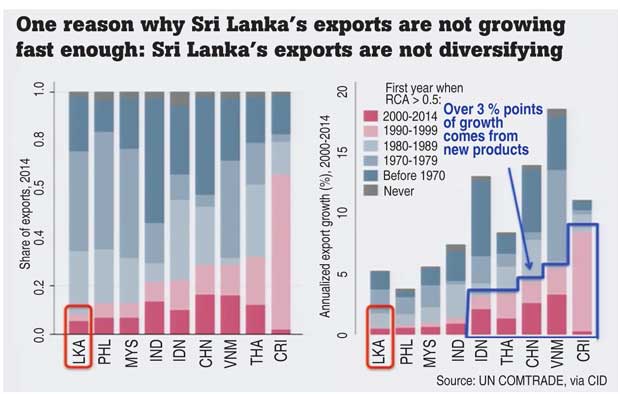
This year, the Global Competitiveness Index (GCI) report measured the performance of 140 nations. The WEF has been measuring economic competitiveness of nations from 1979.
“It assesses the factors and institutions identified by empirical and theoretical research as determining improvements in productivity, which in turn is the main determinant of long-term growth and an essential factor in economic growth and prosperity. The Global Competitiveness Report hence seeks to help decision makers understand the complex and multifaceted nature of the development challenge, to design better policies, based on public-private collaboration and to take action to restore confidence in the possibilities of continued economic progress.” (GCI, 2017-18)
Sri Lanka has slipped from 71st place to the 85th on the WEF GCI this year. According to the report, this is “due to a deteriorating institutional environment, lower goods markets efficiency and infrastructure that is assessed as less well developed”.
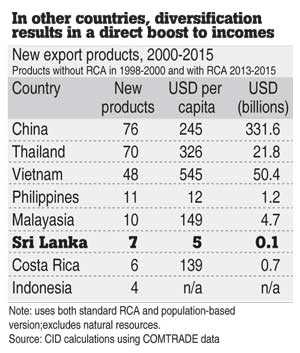
The ranking comes as a shock since Sri Lanka has been further dropped in ranking when compared to 2015 at 68th, 2016 at 71st and 2018 at 85th.
In South Asia, many nations, including Bhutan (up 15 places), Nepal (up 10 places), Pakistan (up seven places) and Bangladesh (up seven places) has improved in competitiveness.
According to the report, the most problematic factors for doing business in Sri Lanka has been the inefficient government bureaucracy, poor work ethic in national labour force and policy instability. Many South Asian nations such as Bangladesh and India face corruption as their topmost problem factor.
Of the 12 pillars of assessment, four pillars of basic requirement monitor institutions, infrastructure, macroeconomic environment, health and primary education.
The other six pillars are the efficiency enhancers, which include higher education and training, goods markets efficiency, labour market efficiency, financial market development, technological readiness and market size. The final two pillars are business sophistication and innovation.
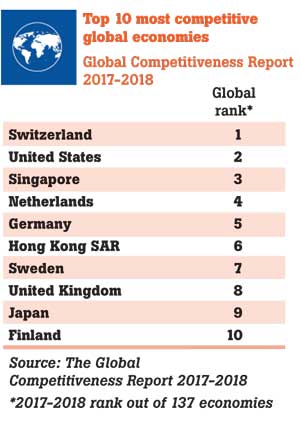
When compared with last year, Sri Lanka has done worse in all 12 pillars albeit a slight improvement in two pillars namely, the macroeconomic environment and market size.
Bangladesh has performed exceptionally well when compared to last year, specially in innovation and sophistication subindex from 116 to 106 – a 10-rank improvement.
Pakistan, when compared to last year, has seen tremendous improvement in all three subindexes and most of the 12 pillars. As many South Asian nations have significant improvements in all 12 pillars of competitiveness, the question remains why has Sri Lanka done worse this year and it should be a concern for our economic policymakers.
According to the report, Sri Lanka’s “macroeconomic stability needs to remain a priority for the government, as the country continues to cope with high levels of debt and tries to restore a sound macroeconomic environment. The government managed to decrease the deficit and stabilize debt after the country entered assistance programme by the IMF in 2016.
Yet, the burden of interest on debt remains high and currently amounts to most of the revenue collected by the government. Inflation also increased and forced the authorities to tighten monetary policy, with negative effects on credit. Business confidence has been declining over the past two years.”
Despite the report showing that we have performed worse than most South Asian nations, Prime Minister Ranil Wickremesinghe recently at the inauguration of a middle-class housing scheme explained, “Total debt exceeds revenue. However, revenue is higher than the debt today but we will have to borrow more. Some thought the government will not be able to manage the economy. However, we successfully managed the economy and increased revenue.” (Daily Mirror September 29).
Due to weak economic planning and miscalculations from many beautification projects to massive infrastructure loans borrowed in the past, unfortunately the mega projects have failed to create revenue or created decent jobs and strengthen the economy. The Central Bank projection was to achieve US $ 7000 by 2020. It is clear that in the present state, we will not achieve this target.
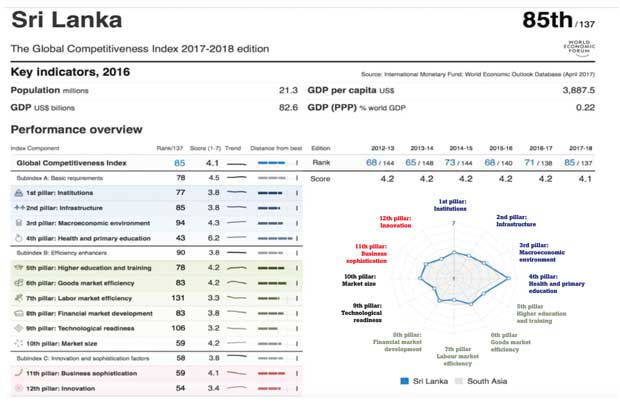
Sri Lanka has not managed to expand its value-added exports and tap into global value chains. At a recent Asian Development Bank forum, as cautioned by young economist and Institute of Policy Studies Research Officer Kithmina Hewage: “The goods included in the export basket of Sri Lanka - that was setup in 1995 and 2015 - were almost identical after 20 years. Vietnam made a decision on its exports and changed its priority structure, which helped them to reach export revenue of US $ 185 billion in 2015 from US $ 5 billion in 1995 but sadly for Sri Lanka that did not change its perspective of exports, ended at US $ 10 billion in 2015 from US $ 3 billion in 1995. Sri Lanka failed to implement economic liberalisation policies for trade and investment as well as establish a stable environment to attract investments, which support plugging into regional value chains.” This same message was echoed by Harvard Prof. Ricardo Hausmann. When Vietnam added 48 new products to its export basket, Sri Lanka has added seven from 2000-2015. Sri Lanka’s seven products did not create much value according to Prof. Hausmann. What we are facing is a serious economic situation. If it is not immediately addressed, with the right set of economic policy prescriptions, the condition will further deteriorate. It is unclear if the investment in further mega infrastructure projects and resetting of the constitution, which will create a headwind towards further instability, are the right kinds of prescriptions at the moment towards strengthening the economic environment.
(Asanga Abeyagoonasekera is a Young Global Leader of the World Economic Forum, Director General of the Institute of National Security Studies and a visiting lecturer in international political
economy (IPE))
04 Jan 2025 3 hours ago
04 Jan 2025 3 hours ago
04 Jan 2025 5 hours ago
04 Jan 2025 5 hours ago
04 Jan 2025 5 hours ago